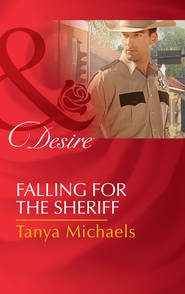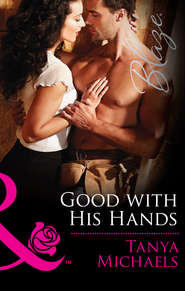По всем вопросам обращайтесь на: info@litportal.ru
(©) 2003-2024.
✖
Claimed by a Cowboy
Автор
Год написания книги
2019
Настройки чтения
Размер шрифта
Высота строк
Поля
“You’ve been drinking!”
“Not uncommon in these parts to honor a person’s memory by hoisting a glass.” He paused. “Can’t say I recall the exact number of glasses, but that’s why I walked. Left my truck at the bar.”
A strange shiver pulsed through her. She was alone in this large house with a broad-shouldered cowboy she barely knew and he might be inebriated. Should she be concerned for her welfare? Wanda had apparently believed in him, but then Wanda had believed a lot of things.
Sam approached, and Lorelei felt the instinct to scoot back, except there wasn’t much room behind her. She was between the ring of pictures and the bottom edge of the sofa. When he crouched down, Lorelei breathed in a subtle blend of denim, soap, beer and the crisp March night. It was unexpected. Rick always smelled like designer cologne—appealing, in a manufactured way, but indistinct from dozens of other successful men.
Sam Travis was distinct.
Looking into his eyes, she couldn’t remember having ever seen a pair like them. “Wh-what are you doing?”
“Helping.”
“I didn’t ask for your help.” It felt invasive, having him loom over these snapshots of her life. The too-short era when her mother and father were both alive, the later pictures of a smiling Wanda and tense adolescent Lorelei.
Sam’s jaw clenched. “Maybe I’m helping her. You’ll probably pick out the most formal portraits in the bunch, regardless of how Wanda would want to be remembered.”
“That’s not true. I’m aware of how different my mother and I are. Were.”
A fuzzy photo that predated the age of clear digital prints caught her eye, this one of a blurry Wanda laughing with tourists at a festival booth. She had thrived on the conversation and merriment around her. At the edge of the picture was a dark-haired smudge. Me. Though it was difficult to tell from the shot, Lorelei had been huddled in a lawn chair with her nose in a book. For all that Lorelei had excelled in school, she’d always had the feeling that her free-spirited mother, who held no degree of her own, would have been more proud if her daughter had put the books down and just enjoyed the sunshine and crowds more.
Sam rocked back on his heels. “Sorry. You’re right, this isn’t my place.” He stood, exiting the room with efficient speed and purpose despite however many glasses he’d drunk in Wanda’s memory.
Lorelei bit her bottom lip hard, staring at the mix of antiques and fanciful touches in this central Texas bed-and-breakfast, none of which spoke to Lorelei or resembled her life in Philly. An all too familiar bubble of alienation surrounded her. It’s not my place, either.
THURSDAY NIGHT, SAM stepped into the kitchen as gingerly as a prowler trying to pass through the house unnoticed. He’d grabbed a burger in town a couple of hours ago, but judging by the angry meow that had greeted Sam as soon as he set foot inside, Oberon had not yet eaten dinner. At least he has his appetite back.
Now that Sam was moving in the direction of the cat food, Oberon trilled his approval and wound figure eights between Sam’s cowboy boots, nearly tripping him. “You know,” he whispered, “you’ll get fed a lot faster if you don’t knock me on my ass.”
The tiptoeing and whispering was embarrassing—but preferable to another charged encounter with Lorelei Keller. Last night, a number of folks in town had been commiserating over Wanda’s death; though Sam wasn’t usually much of a joiner, he’d ended up drinking with them before walking back to the inn. The sight of Lorelei in the middle of the living room had surprised him. She’d looked like a completely different woman with her arms and shoulders bared in a thin tank top, her long dark hair cascading over her skin.
Or maybe it was the play of vulnerability across her face that had changed her appearance. At any rate, it hadn’t taken him long to realize he was intruding on her grief. He didn’t want to make the same mistake twice, especially on a night when he was bone sore and smelled like horse. He’d spent the day several towns over, helping a friend train an Arabian.
Suddenly a woman’s agitated voice cut through the silence. “Yes, but I’m telling you, that’s not necessary!” After that brief outburst, her voice trailed off some—he could only make out the words information and tomorrow. Whatever Lorelei was feeling in the wake of her mom’s death, he’d been wrong to imagine she was fragile and weepy. Even through a closed door, Sam could hear the steel in her voice.
“She’s about as warm and fuzzy as you are,” he told the cat, scooping canned food onto a small mound of kibble. Sam was just placing the plastic bowl in the floor when light flooded the kitchen. He blinked at the sudden illumination.
Lorelei gasped in the doorway, one hand flattened over her chest. Along with a pair of jeans, she was wearing another sweater that seemed too thick for Texas. “Jeez. What are you doing skulking in the dark? You scared the hell out of me.”
Sam glared. No way was he admitting he’d been sneaking around, trying to make himself as invisible as possible, out of respect to her. “I just came in to feed the cat. Someone should,” he said pointedly.
Her lip curled. “I don’t think vamp-cat wants pet store food. He’s after fresh blood. After trying to take a chunk from my leg yesterday, he lacerated my arm this afternoon when I stopped him from running out the front door.”
“Starving an animal does tend to make it mean.” He didn’t share that he himself had once suggested that Lucifer would be a more appropriate name for the animal.
Lorelei sighed. “You’re probably right. Not that he wasn’t mean to begin with, but I was negligent, forgetting to feed him. I suppose there’s a litter box around here somewhere, too?” She made a face. “I’m not used to taking care of anything.”
“Yeah, you don’t seem like the pet-owner type.”
She narrowed her eyes but didn’t argue. Instead, she sidestepped him. “I just came in here to get a drink. I’ll be out of your way in no time.” When she opened the fridge to retrieve a gallon of lemonade, he saw the mountain of food Ava had stocked was virtually untouched.
“You eat any dinner?” he heard himself ask awkwardly. Stupid question. She’s a grown woman, not the cat. She can feed herself when she chooses.
“Actually, no.” Lorelei sounded bemused by the realization. “Guess I forgot. I’ve been working all evening.”
“Working? Surely your bosses don’t expect you to be on call two days before your mother’s memorial service?” Sam had worked for a few hard-hearted SOBs in his time, but they’d all understood stopping to remember the dead.
“It was my choice. And my business.”
Right—so butt out, cowboy. Message received loud and clear.
He tipped his hat to her. “Good night then, Miss Keller. Oh, but before I forget.” Bending to the cabinet beneath the sink, he retrieved a small trash bag and a slotted plastic scooper. “Here. Cat box is in the sunroom.”
LORELEI’S FINGERS SHOOK as she unlocked the back door on Friday morning. In order to pull out her keys, she’d had to set down the cardboard flat she’d carried. The thought of picking it back up didn’t help her trembling. What she wouldn’t give to be in her office right now.
The desperate thought conjured an image of Sam’s disapproving expression last night. No doubt he considered her an unfeeling ice-queen for obsessing over work at a time like this. Not that she gave a damn about his opinion.
Her job was soothing. Numbers and facts and statistics—they’d always lulled her out of anxiety. Wasn’t that why people were supposed to count sheep? Unfortunately, being an actuary wasn’t really a work-from-home kind of career. She’d prevaricated yesterday. Her hours spent on the phone hadn’t been so much working as turning her projects over to two other junior actuaries at the company. Her supervisor had insisted.
“Take a couple of weeks off,” he’d told her. “You haven’t used a single vacation day in what, over a year? You need it. And we need you at one hundred percent. You’re officially on sabbatical.”
Tears stung her eyes. What her boss saw as sabbatical, she saw as exile from the only thing that might keep her sane through the next few days. Today had been awful, and she still had the memorial service and an obligatory meeting with her mom’s lawyer tomorrow.
Maybe I should have let Ava come with me this morning. The older woman had offered, but Lorelei had suspected her mother’s friend would dissolve into tears, threatening Lorelei’s own composure. Taking a deep breath, she carried the open-topped box inside and set it gingerly on the counter. The green-and-azure urn that rose from within was porcelain, decorated with bluebonnets and Indian paintbrush. Objectively, Lorelei had to admit it was a lovely container. Wanda had selected it to coordinate with her late husband’s urn, which bore a picture of a pecan tree.
Hysteria rose inside of Lorelei and erupted as a horrified giggle. Oh, God. This is all that’s left of my family—matching vases.
Reflexively, she reached into her pocket for her cell phone. She could call Celia, see how the policy presentation—which had been Lorelei’s and had now changed hands—was going. Part of Lorelei acknowledged that she was micromanaging a peer and that she was undoubtedly annoying Celia with her offers to answer questions or to email additional background information. As she dialed, she promised herself she’d do something to make it up to other woman when she returned to Philadelphia. For now, Lorelei just needed to survive the next forty-eight hours.
Chapter Four
Picturesque clouds dotted an impossibly blue sky, uninterrupted by air traffic or hazy pollution—only the occasional songbird in flight. The sun shone, but gently enough that no one broke a sweat, even in black mourning attire or a suit jacket. It was the afternoon every bride would want for her wedding.
Well, except for Wanda, who’d once claimed that she’d been “delighted” it rained during her long-ago September wedding and had in fact been hoping for a downpour. She held with the superstition that rain on a wedding day meant good luck. Another tradition she’d embraced was the prewedding Polterabend. Many dishes had been broken in hopes of bringing luck to the happy couple.
Lorelei’s throat tightened as she thought of pictures she’d seen of her parents’ wedding day. They’d been so young and in love! Neither of them had been old enough to die. Yet here Lorelei was once again at a family-owned funeral home that had been part of the community for a hundred years, entering through the same white columns she’d passed through on the day of her father’s memorial service.
One of the brothers who ran the place was at her side immediately, murmuring his condolences and ushering her to the salon where her mother was being honored today. They’d done a lovely job displaying portraits amid floral arrangements, but the overpowering scent of so many competing flowers in a closed space made Lorelei’s nose twitch and irritated her eyes.
Ava and her husband arrived first, immediately followed by other people who had adored Wanda. A crowd gathered around Lorelei, men and women anxious to share their memories of her mother. All around her, the town’s citizens regaled each other with stories. The room took on a buzz that made her feel as if she were trapped in a beehive. Lorelei knew her mom had been a very gracious person, could remember the comfort Wanda had taken in those close to her when her husband had passed. Wanda had laughed with them, cried with them and hugged everyone.
In contrast, Lorelei seemed to stiffen at contact. After thirty minutes, her head throbbed. She kept eyeing the door, wanting to escape and steal a few moments of peace for herself before the official service began.
Halfway through yet another recollection from the head librarian, a woman who had helped Wanda do folklore research for the B and B, Lorelei finally interrupted. “I’m sorry,” she said, placing a conciliatory hand on the woman’s arm. “If you’ll please excuse me for a moment, I just need…” To get the hell out of here. Luckily, the circumstances didn’t require an excuse. The small circle of people who’d gathered around her nodded sympathetically and immediately broke formation so she could pass.
Lorelei went as quickly as decorum allowed toward a side door that led into the employee parking lot. She figured there was less risk that way for running into anyone. The service started in fifteen minutes, and there might still be mourners arriving through the front door.
She stepped outside, lifted her face to the breeze and inhaled deeply when the door shut, muffling the conversations she’d left behind.











